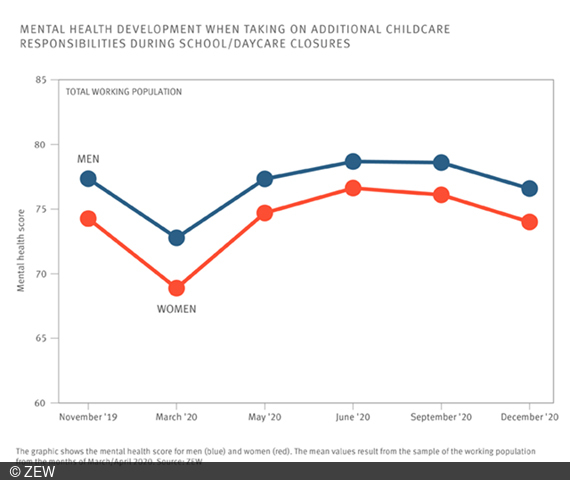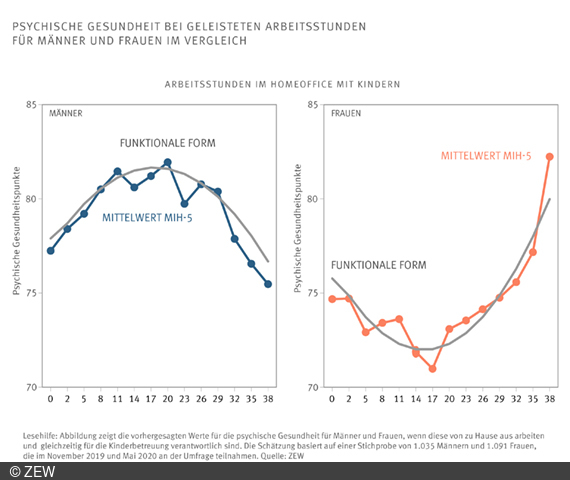Parents Suffer from More Mental Stress Than Other Professionals
ResearchThe mental health risks of COVID-19 and the pandemic-related measures have been a constant topic of public discussion, also in the Netherlands. There, mental health – measured on a scale of 0 to 100 (100 equals perfect health) – declined sharply among employees in the first lockdown, but recovered relatively quickly to levels similar to those before the coronavirus pandemic. The largest decrease in mental health was observed in March 2020, when the first lockdown was imposed. Based on data from the Dutch LISS Panel, a study by researchers from ZEW Mannheim and the universities of Mannheim, Bonn and Tilburg investigates which factors played a particularly important role in increasing mental stress during the pandemic and to what extent these factors changed over time.
According to the study, perceived job insecurity, fear of infection, and emotional loneliness have a negative impact on mental health, although there are differences between men and women. For men, the subjective perception of the risk of becoming unemployed has the strongest impact on mental health (1.5 per cent per standard deviation), followed by the feeling of loneliness during the lockdown (1.2 per cent). For women, on the other hand, emotional loneliness plays the biggest role (3.3 per cent per standard deviation), whereas labour market risks seem to be less relevant. The assessment of one’s own risk of contracting COVID-19 plays a comparatively minor role for both genders (0.3 and 0.5 per cent per standard deviation for men and women, respectively).
Parents of children under the age of 12 experienced a particularly sharp decrease in mental health, namely by 4.3 per cent, between November 2019 and March 2020. “In addition to the high level of uncertainty surrounding the pandemic and their job situation, parents have to cope with the double burden of managing childcare on top of their jobs during lockdowns,” explains Sebastian Seitz, a researcher at ZEW Mannheim and co-author of the study. Parents did not reduce their working hours more than the average in society during the pandemic, but their mental health developed differently depending on how many hours they looked after their children while working from home.
Fathers taking over childcare while working from home particularly suffer from mental stress
The researchers also observed gender-specific effects. On average, men always had higher mental health scores than women. The greatest decline in mental health, however, was seen in fathers who, due to school and daycare closures, took on the additional childcare responsibility while working from home. Mothers’ mental health was particularly affected when they worked from home while their partner was expected to take on the extra childcare hours. “The fact that fathers suffer particularly from school and daycare closures came somewhat as a surprise. Studies on other countries such as the USA or Great Britain came to the opposite conclusion, namely that mothers are particularly affected by mental stress due to the additional burden of childcare,” explains Bettina Siflinger from Tilburg University and co-author of the study. Mothers reached the lowest point with a mental health score of 72 at around 15 hours of working from home including childcare. Fathers, on the other hand, reached their lowest score at around 18 hours of working from home while taking care of children.

